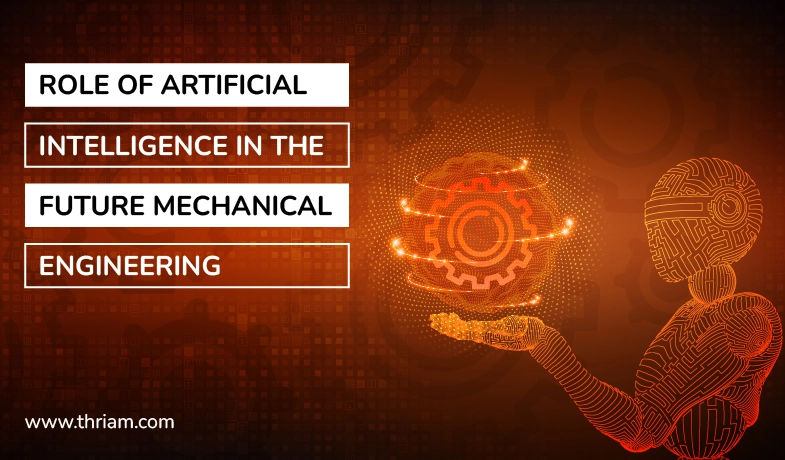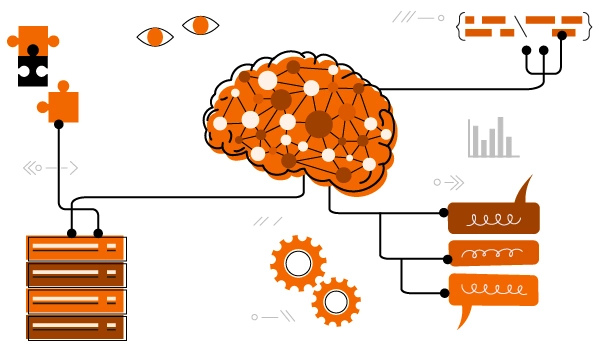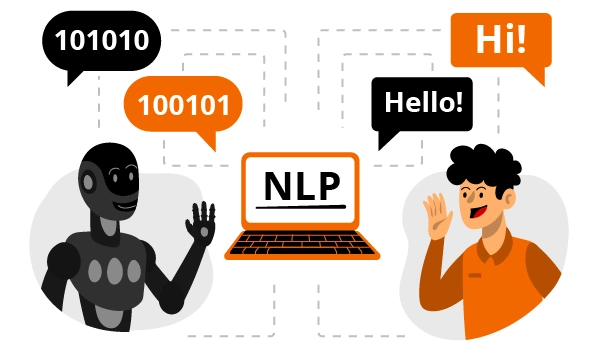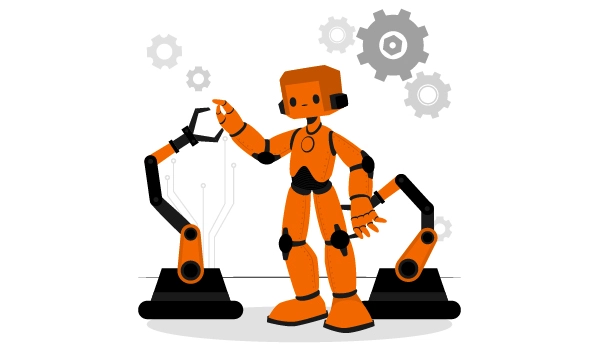Impact of Artificial Intelligence on Mechanical Engineering 2024

Artificial Intelligence (AI) has revolutionized various industries, and its impact on mechanical engineering cannot be overlooked. AI technologies, such as machine learning, computer vision, and robotics, are reshaping the field by enhancing efficiency, automation, and safety, and reducing human error. In this blog, we will explore the significant ways in which AI is influencing mechanical engineering.
What is Artificial Intelligence?
Artificial Intelligence (AI) is a branch of computer science that focuses on creating intelligent machines capable of performing tasks that typically require human intelligence. AI systems are designed to mimic human cognitive abilities such as learning, reasoning, problem-solving, perception, and language processing.
At its core, AI involves the development of algorithms and models that enable machines to acquire knowledge, process information, and make intelligent decisions. These algorithms are driven by data, which the machine uses to learn and improve its performance over time.
There are two primary types of AI: Narrow AI and General AI. Narrow AI, also known as Weak AI, is designed to excel in specific tasks and functions. Examples of narrow AI include voice assistants like Siri and Alexa, or image recognition software used in facial recognition technology.
On the other hand, General AI, also referred to as Strong AI or Artificial General Intelligence (AGI), is the concept of creating machines that possess human-like intelligence and can perform any intellectual task that a human being can do. General AI remains an area of ongoing research with significant challenges to overcome.
AI is powered by several key technologies:
-
Machine Learning (ML):
This subset of AI focuses on designing algorithms that enable machines to learn from data and improve their performance over time. ML algorithms can recognize patterns, make predictions, and identify anomalies in large datasets.

-
Natural Language Processing (NLP):
NLP enables machines to understand and interpret human language. It involves techniques for language generation, sentiment analysis, voice recognition, and language translation.

-
Computer Vision:
Computer vision allows machines to perceive and interpret visual information from images or videos. It is often used in facial recognition, object detection, and autonomous vehicles.

-
Robotics
Robotics combines AI with mechanical engineering to create intelligent machines that can interact with the physical world. Intelligent robots can perform complex tasks, such as assembly or navigation, with precision and adaptability.

Artificial Intelligence has transformed numerous industries, including healthcare, finance, transportation, and manufacturing. It has the potential to revolutionize our lives by driving innovation and automation, improving efficiency, and enhancing decision-making processes.
As AI continues to advance, ethical considerations around its use and potential impact on employment and society emerge. It is essential to approach AI development and deployment responsibly, ensuring transparency, fairness, and accountability.
Design and Simulation:
AI enables engineers to create sophisticated designs and perform simulations with greater accuracy and efficiency. Machine learning algorithms can analyze large datasets and generate optimized designs based on specific requirements. Additionally, AI-powered simulation tools can simulate real-world environments and predict the performance of mechanical systems before they are physically built, saving time and costs.
Automation and Robotics:
Robotic systems with AI capabilities have become integral in mechanical engineering, particularly in manufacturing. AI-powered robots can perform complex tasks, such as assembly, welding, and material handling, with high precision and speed. These robots are programmed to learn from their interactions, adapting to new situations and continuously improving their performance, thereby enhancing productivity and eliminating repetitive tasks for human workers.
Predictive Maintenance:
AI algorithms can analyze sensor data from machines and equipment, enabling predictive maintenance. By monitoring real-time performance, detecting anomalies, and predicting potential failures, mechanical engineers can schedule maintenance tasks in a more cost-effective and timely manner. This approach minimizes unplanned downtime, optimizes equipment lifespan, and reduces maintenance costs.
Energy Efficiency:
AI algorithms can optimize energy consumption in mechanical systems. By monitoring and analyzing operational parameters, such as airflow, temperature, and pressure, AI can adjust components and processes in real-time to achieve maximum energy efficiency without compromising performance. This is crucial in industries such as HVAC, where energy consumption plays a significant role.
Supply Chain Optimization:
AI algorithms can optimize supply chains by analyzing large volumes of data and considering variables such as demand, production capacities, transportation routes, and inventory levels. By predicting demand fluctuations, optimizing distribution networks, and reducing lead times, AI helps streamline the supply chain process, reducing costs and improving overall efficiency.
Enhanced Safety:
AI technologies improve safety in mechanical engineering by minimizing human error and increasing precision. For instance, AI-powered robots can be used in hazardous environments, reducing the risk of accidents for human workers. Additionally, AI-enabled systems can continuously monitor and detect anomalies, initiating safety protocols in real time, thereby preventing potential accidents or equipment failures.
Advantages and Disadvantages of Artificial Intelligence in Mechanical Engineering
Artificial Intelligence (AI) has emerged as a powerful tool in the field of mechanical engineering, bringing both advantages and disadvantages to the industry. Let's explore some of the key benefits and potential drawbacks of using AI in mechanical engineering.
Advantages:
- Enhanced Efficiency: AI algorithms help automate various mechanical engineering tasks, improving efficiency and productivity. Processes such as design optimization, simulation, and quality control can be performed at a faster pace, reducing time requirements and enhancing overall productivity.
- Precision and Accuracy: AI-powered systems can perform complex calculations and simulations with precise accuracy, minimizing human error. This capability is especially valuable in critical tasks such as design analysis, integrity testing, and manufacturing processes, where precision is of utmost importance.
- Increased Safety: AI technologies enable the development of sophisticated robots and automated systems that can perform risky tasks in hazardous environments. By replacing humans in such scenarios, AI-driven machines adhere to stringent safety protocols, reducing the potential for accidents and safeguarding human lives.
- Predictive Maintenance: AI algorithms can monitor and analyze equipment data to predict maintenance needs. By detecting potential failures in advance, mechanical engineers can plan maintenance activities effectively, reducing downtime and optimizing equipment lifespan. This approach leads to cost-saving benefits and efficient maintenance strategies.
Disadvantages:
- Lack of Creativity: While AI algorithms excel in repetitive tasks and decision-making based on patterns and data, they struggle with creative problem-solving and intuition. Mechanical engineering often requires innovative thinking and decision-making based on judgment, which may be challenging for AI systems to replicate accurately.
- Reduced Human Involvement: As AI systems take over more tasks, human involvement and expertise may diminish. This can potentially limit the development of human skills and intuition that come from hands-on experience. Engineers must strike a balance between utilizing AI for automation and retaining necessary human expertise.
- Dependence on Data Quality: AI relies heavily on training data to make accurate decisions. If the data used for training AI models is incomplete, biased, or of poor quality, it can lead to flawed outcomes and unreliable predictions. Ensuring data accuracy and quality becomes essential to maximize the advantages of AI in mechanical engineering.
- Ethical Concerns: The use of AI in mechanical engineering also raises ethical considerations. For example, when using AI-enabled robots in the workforce, issues such as job displacement, privacy concerns, and algorithmic biases can arise. It is crucial to address these ethical implications and ensure responsible AI implementation.
Conclusion:
Artificial Intelligence is fundamentally transforming mechanical engineering by facilitating efficient design, automation, predictive maintenance, energy optimization, supply chain management, and enhanced safety. The integration of AI in the field will continue to drive innovation, improve productivity, and create new opportunities for mechanical engineers. As advancements in AI continue to evolve, it is imperative for professionals in mechanical engineering to embrace and adapt to these technologies to remain competitive in the ever-changing landscape of industry.



